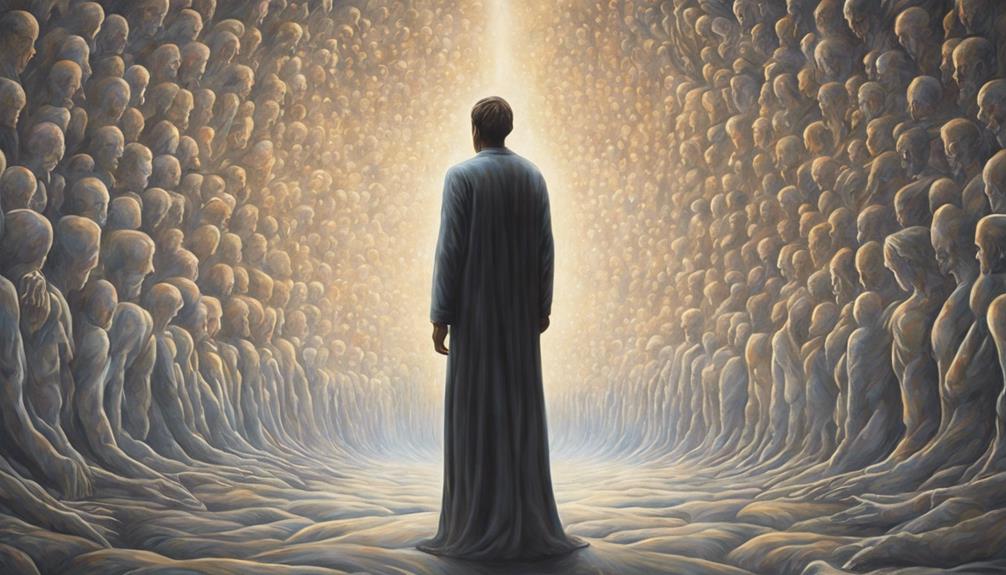Delving into the complexity of the Melancholic Personality Type uncovers an intriguing depth within individuals who possess this temperament. Their distinctive mix of reflection and sensitivity provides a glimpse into a realm where feelings are profound and creativity thrives.
As we navigate through the traits and characteristics that define Melancholics, we uncover a tapestry of complexities that shape their interactions and relationships.
Stay tuned to unravel the layers that make this personality type both intriguing and enigmatic, shedding light on how understanding them can lead to more profound connections and insights.
Key Takeaways
- Perfectionism and creativity drive the melancholic personality.
- Sensitivity fosters empathy and deep connections.
- Introspection promotes self-awareness and growth.
- Challenges like anxiety require proactive coping strategies.
Key Traits of Melancholic Personality
Delving into the realm of melancholic personalities reveals a tapestry of intricate traits that shape individuals in profound ways. The key traits of a melancholic personality encompass a unique blend of characteristics that distinguish this temperament. Perfectionism is a prominent feature, driving individuals to strive for excellence in their endeavors. This pursuit of perfection often intertwines with creativity, as melancholics possess a deep well of imaginative ideas and artistic inclinations.
Sensitivity is another cornerstone of the melancholic personality, allowing individuals to empathize with others on a profound level. Loyalty is a defining trait, leading melancholics to form deep and lasting connections with those they hold dear. Their introspective nature enables them to reflect deeply on their thoughts and emotions, fostering a keen self-awareness.
Furthermore, melancholics exhibit a strong focus on detail, showcasing their meticulous and thorough approach to tasks. This attention to intricacies is complemented by their inherent trustworthiness, making them reliable and steadfast companions. Their caring attitude shines through in their interactions, as they prioritize the well-being of others above all else.
Melancholic Temperament and Interactions

Exploring how the melancholic temperament influences interactions sheds light on the nuanced dynamics of individuals with this personality type. Melancholic individuals, known for their introverted nature, often prefer small gatherings or intimate settings for socializing. Their introspective tendencies can sometimes make communication challenging, as they may find it difficult to express their thoughts and feelings openly. In relationships, creating a safe and supportive environment that encourages honest communication is key to fostering strong connections with melancholic individuals.
Engaging in creative activities can play a significant role in enhancing the social experiences of melancholic personalities. Embracing their unique perspectives, sensitivity, and depth of emotions can transform what may seem like a hindrance into a source of strength and creativity. By recognizing and appreciating the strengths that come with their introverted nature, melancholic individuals can develop meaningful and fulfilling relationships that align with their temperament.
Strengths and Weaknesses
Understanding the strengths and weaknesses inherent in the melancholic personality type is essential for personal development and nurturing meaningful relationships. Melancholics are deep thinkers, often displaying creativity and empathy. Their attention to detail and high standards make them dependable and trustworthy individuals. However, they also face challenges such as self-criticism, pessimism, and anxiety, which can hinder their personal growth.
- Strengths:
- Dependability and loyalty
- Empathy towards others
- Creativity in problem-solving
- Attention to detail in tasks
- High standards in all aspects of life
- Weaknesses:
- Self-criticism leading to low self-esteem
- Pessimism affecting their outlook
- Anxiety that can be overwhelming
- Stubbornness in their beliefs
- Overthinking situations
Melancholics' strengths contribute to their trustworthy and caring nature, while their weaknesses, like self-criticism and anxiety, can be areas for personal development and growth. Understanding these aspects can aid in navigating relationships and fostering personal well-being.
Melancholic in Different Personality Systems

Moving from exploring the strengths and weaknesses of the melancholic personality, the melancholic temperament plays a significant role in various personality systems, such as the Four Temperaments and the Big Five personality traits. Melancholic individuals are often associated with traits like introspection, sensitivity, and creativity in these frameworks. Understanding the melancholic personality type can provide insights into how individuals approach emotions, relationships, and decision-making processes.
In different personality systems, the emphasis on melancholic traits may vary slightly, but core characteristics remain consistent. The presence of melancholic traits in personality assessments offers valuable information for personal growth, communication styles, and relationship dynamics. These assessments can illuminate how individuals with a melancholic temperament engage with others, make decisions, and navigate the complexities of their emotions.
Melancholic Personality and Mental Health
Melancholic personalities, characterized by heightened sensitivity and introspection, often face challenges related to mental health, particularly with issues like anxiety and depression. The introspective nature of melancholic individuals can sometimes lead to rumination, exacerbating feelings of sadness and contributing to depressive tendencies.
Additionally, their higher levels of neuroticism may result in increased worry and anxiety, impacting their overall mental well-being. To address these challenges, proactive coping strategies are essential. Seeking online therapy can be a beneficial avenue for melancholic individuals to process their emotions, receive support, and work towards improving their mental health.
Prioritizing self-care, practicing mindfulness, and knowing when to seek professional help are crucial steps in managing the mental health issues that often accompany the melancholic personality.
Frequently Asked Questions
What Are the Characteristics of a Melancholic Person?
When we explore the characteristics of a melancholic person, we notice traits such as perfectionism, creativity, and sensitivity. These individuals are known for their introspective nature, deep emotional connections, and high empathy levels.
Their attention to detail, trustworthiness, and thoughtful actions set them apart. While they may lean towards sadness at times, their conscientiousness, loyalty, and profound understanding of emotions make them unique and valuable in relationships.
What Are the Weakness of Melancholic People?
When it comes to the weaknesses of melancholic individuals, it's important to recognize their tendency towards self-criticism, pessimism, and anxiety. These traits can lead to overthinking decisions and holding onto past hurts, hindering their ability to trust and feel secure.
Understanding these challenges can help us support those with melancholic tendencies in cultivating healthier coping mechanisms and fostering self-compassion.
Who in the Bible Had a Melancholy Temperament?
In the Bible, various figures exhibited traits of a melancholic temperament. These individuals, like King David, Job, Jeremiah, Elijah, and Jonah, displayed deep emotional expressions, introspection, struggles, emotional sensitivity, and inner conflict.
Their stories showcase the complexities of melancholic personalities, highlighting intense emotions, profound reflections, and struggles with divine missions.
These characters offer insights into the intricacies of melancholy within the broader context of human experiences and spiritual journeys.
What Makes Melancholics Angry?
When we explore what triggers anger in melancholics, it often roots in their deeply held values being compromised or feeling unappreciated. Injustice or disruptions to their need for stability can also provoke this emotion.
Melancholics tend to internalize their anger, leading to passive-aggressive responses or emotional withdrawal. Criticism, particularly when it feels unjust, can be a significant trigger.
Additionally, chaos, unpredictability, or lack of control can overwhelm those with this temperament, leading to anger.
Conclusion
In conclusion, the Melancholic personality type is a delicate tapestry of emotions, creativity, and introspection. Their depth of feeling and artistic sensibilities make them the true poets of life, weaving stories with their souls.
While their self-doubt and perfectionism can be overwhelming at times, their loyalty and empathy shine through like beacons in the darkness. To truly understand a Melancholic is to dive into the depths of their soul and appreciate the beauty that lies within.
Felicity, our Author, pens in-depth articles and guides that delve into the heart of personal discovery. Her narrative-driven approach weaves together theory, practice, and personal anecdotes, making the journey of self-exploration both relatable and inspiring. Felicity’s contributions help illuminate the path for those seeking a deeper understanding of themselves and their relationships.










